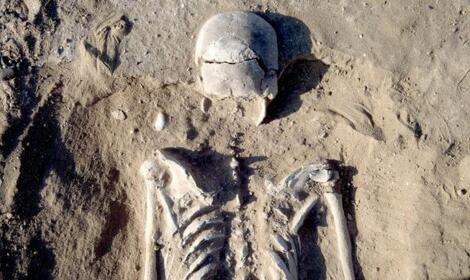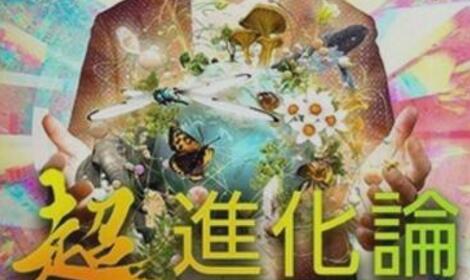(上)据估计,现代人类大约有20万年的历史,但似乎99%的技术进步都发生在过去的1万年里。在那之前我们在做什么?
正文翻译

Modern humans are estimated to be about 200,000 years old, but it seems that 99% of technological progress has occurred in the last 10,000 years. What were we doing before that?
据估计,现代人类大约有20万年的历史,但似乎99%的技术进步都发生在过去的1万年里。在那之前我们在做什么?

Modern humans are estimated to be about 200,000 years old, but it seems that 99% of technological progress has occurred in the last 10,000 years. What were we doing before that?
据估计,现代人类大约有20万年的历史,但似乎99%的技术进步都发生在过去的1万年里。在那之前我们在做什么?
评论翻译
Balaji Viswanathan
Short answer There was a Chemist who was explaining to a layperson that he discovered the right combination in his 3000th trial. The layperson responded, "why didn't you do the 3000th trial the first time itself?" Life is a series of experiments and sometimes it can take a long time to get to the answer. Besides the start of Holocene (11700 ago) produced some dramatic changes in global climate that made things favorable for agriculture. Before that, the ice ages called Riss and Wurm made life hard for humans for 10s of thousands of years & even bare survival was brutally hard. [We are in the most favorite climatic condition possible and that is why scientists are so worried by climatic change that can lead to some what our ancestors faced]
简短的回答
有一个化学家向一个门外汉解释说,他在第3000次试验中发现了正确的组合。外行回答说:“你为什么不第一次就去做第3000次的组合呢?”
生活就是一系列的实验,有时候需要很长时间才能得到答案。此外,全新世(11700年前)的开始是全球气候发生了一些戏剧性的变化,这对农业有利。在此之前,被称为Riss和Wurm的冰河时代使人类的生活变得艰难了且持续了数万年,即使是勉强生存也非常艰难。
我们生活在最适宜的气候条件下,这就是为什么科学家们如此担心气候变化,因为气候变化可能会导致我们将面临祖先曾经面临的一些问题。
We took tens of thousands of years to settle down (starting from the migration in Africa). After we settled down, we discovered ways to domesticate plants about 12,000 years ago, discovered metals about 8000 years ago and started writing things about 5000 years ago. Each of these steps helped us bring the humans together and build ideas on top of another. Let us look at some of the major events in human history.
我们花了数万年才定居下来(从非洲移民开始)。在定居下来之后,我们在大约12000年前发现了驯化植物的方法,在大约8000年前发现了金属,在大约5000年前开始书写。这些步骤中的每一步都帮助我们将人类聚集在一起,并在另一个之上建立想法。让我们来看看人类历史上的一些重大事件。
Long Answer
Migration from Africa: The modern humans are believed have evolved around 200,000 years ago. Recent African origin of modern humans. For the first 100,000 years we remained there until some unexplained sequence of events started forcing them outward. Then humans started walking and it took multiple generations for them to survive the deserts Africa to reach Europe and Asia, and later the Americas. Imagine walking the Sahara or Arabian desert with no shoes, water cans or camels. Only when we started settling, did we have the time and resources to build something that could be passed on to the future generations. Without that settlement, great ideas would have died with the person or the tribe. Our first major settling down happened around 12000 BC. Sedentism
长答复
从非洲移民——现代人类被认为是在20万年前进化而来的。近代非洲起源的现代人类。在最初的10万年里,我们一直呆在那里,直到一些无法解释的事件开始迫使它们向外移动。后来人类开始步行,经过几代人的努力,他们才从非洲的沙漠中生存下来,到达欧洲和亚洲,后来又到达美洲。想象一下,在撒哈拉沙漠或阿拉伯沙漠行走,不穿鞋,不带水罐,也不骑骆驼。
只有当我们开始定居,我们才有时间和资源来建造一些可以传承给后代的东西。如果没有这种定居,伟大的思想就会随着个人或部落的消亡而消亡。人类第一次大规模定居大约发生在公元前12000年。
Low Population: Until about 10000 BCE, world population never exceeded 15 million and mostly was around 1 million. Urban World History The present population of the world is 7 billion and 1 million is comparable to the population of a medium size city. When you have just a couple of million people spread in this big wide world, there is little that humanity could collectively build. Even if we assume that early human being could be as productive as us, their civilization could produce less than 1/1000 of what our society could do.Life Expectancy: From that point until 20th century, we had a very low life expectancy (about 30 years). Imagine if we all died by the time we reached 30, how much could we learn from our parents and how much can we teach our kids. Given the low life expectancy of early humans, there was not much time to learn and teach. We just started randomly doing whatever we could to survive. Life expectancy
低人口:直到公元前10000年左右,世界人口从未超过1500万,大部分都在100万左右。根据“世界城市史”网站数据,目前世界人口为70亿,100万人口相当于一个中等城市的人口。当你只有几百万人分布在这个广阔的世界上时,人类可以集体建设的东西很少。即使我们假设早期人类可以和我们一样多产,他们的文明也只能生产我们社会所能生产的千分之一。
预期寿命:从那时起直到20世纪,我们的预期寿命都很低(大约30岁)。想象一下,如果我们都在30岁时死去,我们能从父母那里学到多少,又能教给孩子们多少? 考虑到早期人类的预期寿命很低,没有太多的时间来学习和教学。我们只是开始随机地做我们能做的一切来生存。

4. Use of fire: Early humans didn't find a way to use the fire in a controlled way. This means we often lived in the dark (no fire means no lights), cold and scary place. Control of fire by early humans. Only since about 125,000 BP we started using fire in a controlled way and it took a lot of trial and error.
5. No sophisticated tools and domesticated animals: Early humans used primarily stone tools and until about 50,000 BC these were quite crude. They helped a little bit in hunting, but didn't take us far. We had to wait until 6000 BC to get our first metal - Gold. History of Metals. With metals, we could tackle a lot more elements and do far more tools. We didn't have any animal to help us out. We first started domesticating dogs and later sheep, pig, horse, etc. Each of the domestication waves took 1000s of years of trial and error. Domestication
使用火:早期人类没有找到一种有控制地使用火的方法。这意味着我们经常生活在黑暗(没有火意味着没有灯)、寒冷和可怕的地方。早期人类对火的控制。直到大约12万5000年前 ,我们才开始以一种可控的方式使用火,这需要大量的试验和犯错。
没有复杂的工具和驯养的动物:早期人类主要使用石器工具,直到公元前5万年左右,这些工具都非常粗糙。它们在打猎中起了一点作用,但并没有带我们走远。我们不得不等到公元前6000年才得到第一种金属——黄金。链接:《金属的历史》 有了金属,我们可以处理更多的东西,制作更多的工具。我们没有任何动物来帮助我们。我们首先开始驯养狗,后来驯养羊、猪、马等。每一波驯化浪潮都经历了1000年的试错。
6. Civilization allowed us spare time. By 12000 BCE, many groups of humans found habitable regions to grow their tribe. They had found ways ways to domesticate a few plants & animals and had made superior tools. As large groups of humans started gathering and work year-around in the same place, we found ways to share and transmit ideas. Trade was discovered and humans suddenly found spare time to do stuff. Civilization.
Until that point we spent most of our time in survival mode. Once we could crop and store stuff, we had plenty of time for pleasure. That meant that we could start building stuff (for worship and living), organizing into more complex groups and start specializing. Human evolution
文明给了我们空闲时间。到公元前12000年,许多人类群体找到了适宜居住的地区来发展他们的部落。他们已经找到了驯化一些植物和动物的方法,并制造了优越的工具。随着一大群人开始全年聚集在同一个地方工作,我们找到了分享和传递思想的方法。贸易被发现,人们突然有了空闲时间做事情。
在那之前,我们大部分时间都在生存模式中度过。一旦我们可以收割和储存东西,我们就有了足够的时间来享乐。这意味着我们可以开始建造东西(用于敬拜和生活),组织成更复杂的团体,并开始专业化。
7. Writing began. History of writing It was about 3000 BCE when we actually started putting our ideas into a pictorial form. Until that point, most of the ideas that humans generated would have evaporated. Imagine, if we had no science books. Each generation would have to discover Newton's laws and all other scientific theories by themselves. With writing, we could stand on the shoulders of others.
Then we discovered the wheel about 4000 years ago. This allowed us to travel fast and transfer products and humans between regions. Then the rest is history. In short, we spent a lot of time in a trial-and-error mode to find the right places to live and the right things to eat. Given the short life spans and absence of settlements, ideas could not get transmitted. As we discovered ways to keep us warm and bright at night, got spare time due to agriculture we started putting our brains to a good use.
开始写作。大约在公元前3000年,我们开始将我们的想法以图画的形式表达出来。在那之前,人类产生的大部分想法都已经消失了。想象一下,如果我们没有科学书籍。每一代人都必须自己发现牛顿定律和所有其他科学理论。但通过写作,我们可以站在别人的肩膀上。
然后我们在大约4000年前发现了轮子。这使得我们能够快速旅行,在不同地区之间转移产品和人员。然后剩下的就是历史了。简而言之,我们花了很多时间在试错模式中寻找合适的居住地和合适的食物。由于寿命短,又没有定居点,思想无法传播。当我们发现了让我们在晚上保持温暖和明亮的方法,由于农业又有了闲暇时间,我们开始充分利用我们的大脑。
Innovation/Invention requires a lot of trial and error and the ability to build on previous results. Until a few thousand years ago, these experiments were local and there was little we could learn from others experiments. Thus, a guy in Ethiopia might have been trying to master fire control even 5000 years after a guy in Sweden has already mastered it. There was no easy way to transfer ideas given the lack of wheel (to enable quick movement), writing systems, broadcast communication etc. The population was also too low to improve the odds of experimentation. Lastly, we were too focused on survival to afford us the time to innovate. Agriculture liberated us from the focus on the daily search for food.
Finally, we are constantly discovering about our past and our knowledge of our ancestors is not complete. 100 years ago we didn't know about the magnificent Indus Valley civilization and knew little of Mesopotamia or Incas. New discoveries are constantly pushing back the known history and I would not be surprised if we discover more complex civilizations from 10000 BC that have just been lost due to the passage of time.
创新/发明需要大量的试错,以及建立在先前成果基础上的能力。直到几千年前,这些实验都是地方性的。因此,一个埃塞俄比亚人可能在瑞典人已经掌握火控5000年之后才开始尝试掌握火。由于没有轮子(能够快速移动)、书写系统、广播通信等,传递想法并不容易。人口也太少,无法提高实验的几率。最后,我们太专注于生存,没有时间创新。农业把我们从每天寻找食物的工作中解放出来。
最后,我们不断地发现我们的过去,我们对祖先的了解并不完整。100年前,我们不知道壮观的印度河流域文明,对美索不达米亚和印加也知之甚少。新的发现不断地把已知的历史往前推,如果我们发现公元前10000年的更复杂的文明,只是因为时间的流逝而消失了,我不会感到惊讶。
Páll Kvaran
Great answer.
However, I think you give life expectancy way too much weight. As your source explicitly shows, life expectancy at 15 was still beyond 50 years during various eras. This means that very high child mortality was the main reason for the low life expectancy at birth.
You say "Imagine if we all died by the time we reached 30". This is not the case. The people who actually lived beyond childhood were dying at beyond 50 on average. Modern science has actually not been able to do that much to raise the life expectancy of people after the age of 15. We are only talking about 10-20 years, depending on the country in question.
Let´s face it, children have, historically, not done much to advance the frontiers of science. That point is thus invalid.
优秀的答复。
然而,我认为你太看重预期寿命了。正如你的资料明确显示的,在各个时代,15岁的预期寿命仍然超过50岁。这意味着极高的儿童死亡率是出生时预期寿命较低的主要原因。
你说:“想象一下,如果我们都在30岁的时候死了。”事实并非如此。真正活过童年的人平均寿命超过50岁。现代科学在提高15岁以后人们的预期寿命方面做得并不多。我们说的只是10到20年的时间,这取决于所涉及的国家。
让我们面对现实吧,从历史上看,孩子们并没有为推进科学前沿做出太多贡献。因此,这一点是无效的。
Ashley Meyer
You claim that it took several generations to "walk through" the desert of northeastern Africa, but there's a lot of evidence that the Sahara wasn't always a desert. From 133,000 years ago to 122,000 years ago, the eastern Sahara was humid & rainy, which is when humans were "passing through" northeast Africa, i.e. living there for 10,000 years. (Then the Sahara went back to being dry, then briefly rainy again around 9,000 years ago.)
My sources:Sahara pump theory - 185,000 - 20,000 years ago
Page on Huji ("Desert speleothems reveal climatic window for African exodus of early modern humans")
你声称“走过”非洲东北部的沙漠耗费了几代人的时间,但有很多证据表明撒哈拉并非一直都是沙漠。从13.3万年前到12.2万年前,撒哈拉东部潮湿多雨,这是人类“路过”非洲东北部的时期,即在那里生活了1万年。(然后撒哈拉沙漠恢复干燥,然后在大约9000年前再次短暂降雨。)
我的来源:
链接:《撒哈拉泵理论——185,000 - 20,000年前》、《Page on Huji》(“沙漠洞穴揭示了早期现代人类出非洲的气候窗口”)
Enric Martinez
It's not because it was a desert, but because of it's wastness. Don't see it as people wandering trying to reach Europe: They didn't cared about crossing the Sahara, they were just _Living_ there, that's why it took several generations.
这并不是因为它是沙漠(所以才迁徙),而是因为它荒凉(不再适宜居住)。不要把它看作是人们为了到达欧洲而四处流浪:他们并不在乎穿越撒哈拉沙漠,他们只是在那里生活,这就是为什么花了几代人的时间。
Shashvat Prakash
Life expectancy of 30 years does not mean that adults lived to 30 years. A good proportion of children did not survive childhood, skewing the expectancy figure lower. Conversely, children who survived to a certain age lived long lives as adults. Also, your understanding of tools is similarly oversimplified. How is it that nomads hunting mammoth were abe to survive frigid arctic environments and cross continents? How is it that -- from your own figure -- the unsophisticated humans crossed large bodies of water? All of these happened before the introduction of metals.
预期寿命30岁并不意味着成年人能活到30岁。很大比例的儿童没有活过童年,导致预期数字下降。相反,活到一定年龄的儿童成年后寿命更长。同样,你对工具的理解也过于简化了。狩猎猛犸象的游牧民族是如何在寒冷的北极环境中生存下来并穿越大陆的?从你自己的设想来看,那些不成熟的人类是如何横渡大片水域的?
所有这些都发生在金属被引入之前。
Balaji Viswanathan
1. Child survival roles did play a role. But, adult survival rates were not that great either. Moreover, given the absence of dentistry and modern medicine the middle ages were hard to survive.
2. Many animals survive harsh climates. That doesn't mean they develop tools. Early humans did have tools. But, most were crude, stone implements.
Crossing large bodies of water was often by accident when humans in tiny rafts were washed away by water.
儿童生存确实发挥了作用。但是,成年人的存活率也没有那么高。此外,由于没有牙科和现代医学,中世纪很难生存。
许多动物能在恶劣的气候条件下生存。这并不意味着他们会开发工具。早期人类确实有工具。但是,大多数都是粗糙的石器。
当乘坐小木筏的人被水冲走时,穿越大片水域通常是偶然的。
Shashvat Prakash
1. So early humans didn't generally make it past middle age. Now for purely information transfer purposes that still leaves ample time to educate the next generation. According to a neuroscientist, the main difference between chimps and humans which explains human domination is not IQ - IQ will generally overlap between the species. It is the fact that human fathers play a role in their offspring's education.
2. The animals which survive near arctic climates did not evolve in African hills; their biology evolved for the environment. Also, there is much to appreciate about these crude stone implements, as they facilitated survival and migration. Anthropologists can identify many types of paleolithic tools, each crafted for a specialized role.
Generally speaking, our species initially had no 'need' for technological advancement beyond the marginal advantage it would have given an individual or tribe over his or her competitors. What happened next was a sort of prisoner's dilemma. Marginal changes in technology would benefit a certain tribe over a certain period, until faced with a greater technological threat. Technology was lixed to how well a tribe survived, and then, as competition increased, so did the rate of sophistication.
所以早期人类一般都活不过中年。现在纯粹为了信息传递的目的,(这样的预期寿命)仍然有足够的时间来教育下一代。根据一位神经科学家的说法,黑猩猩和人类之间的主要区别并不是智商——智商在物种之间通常是重叠的。事实上,人类的父亲在后代的教育中起着一定的作用。
在北极气候附近生存的动物并没有在非洲山区进化;它们的生物学是为适应环境而进化的。此外,这些粗糙的石器有很多值得欣赏的地方,因为它们促进了生存和迁徙。人类学家可以辨认出许多种旧石器时代的工具,每一种都有其专门的用途。
一般来说,我们人类最初并不“需要”技术进步,因为技术进步会让个人或部落相对于他或她的竞争对手拥有边际优势。接下来发生的是一种囚徒困境。在一段时间内,技术的微小变化会让某个群体受益,直到他们面临更大的技术威胁。技术与部落的生存息息相关,然后,随着竞争的加剧,复杂程度也随之提高。
Nicolás Rivas
Great answer, but in some points too simplistic. "Imagine, if we had no science books. Each generation would have to discover Newton's laws and all other scientific theories by themselves. With writing, we could stand on the sholders of others." This statement completely ignores oral transmition of knowledge, which was highly elaborate, and the origin of literature and poetry.
回答得好,但在某些方面太简单了。
“想象一下,如果我们没有科学书籍。每一代人都必须自己发现牛顿定律和所有其他科学理论。通过写作,我们可以站在别人的肩膀上。”
这种说法完全忽略了知识的口头传播,它可以达到非常高的水平,以及文学和诗歌的起源。
Balaji Viswanathan
Oral transmission was highly local and I don't think it was that significant before 10000 BC.
口头传播是高度地方性的,我认为在公元前10000年之前没有那么重要。
Nicolás Rivas
I'm not saying, of course, that oral transmission can compete with writing. But I think it was highly significant, there is fundamental knowledge coming from before 10000 AD, and that reached us only through oral transmission. Think about the Odyssey and the Iliad, both highly complex texts, and fundamental in the development of literature until today, and they come from oral tradition.
当然,我并不是说口头传播可以与书面传播竞争。
但我认为这是非常重要的,在公元10000年之前,有一些基本的知识是通过口头传播传到我们这代的。想想《奥德赛》和《伊利亚特》,它们都是非常复杂的文本,也是直到今天文学发展的基础,它们都来自口述传统。
Balaji Viswanathan
You have a point, but historians have found no major oral transmission stories that are older than 10000 BC. Maybe we will find some in the future. Also, the languages were evolving and getting consolidated. If there were a million languages (like in many tribal communities) the oral traditions will often wither out.
你说得有道理,但历史学家没有发现公元前10000年以上的主要通过口头传播的故事。也许我们将来会找到一些。此外,语言也在不断发展和巩固。如果世界上有一百万种语言(就像在许多部落社区一样),口头传统往往会消亡。
Payal Sharma
though some of your points are really good but do you really think that for first 100,000 years we stayed in Africa doing nothing?
See we were in intelligent species at that time also and I don't think we can't stay 100,000 years at some place without doing something exceptional.
If you see our last 5000 years how much we progressed. Even in some field we started from scratch.
虽然你的一些观点很好,但你真的认为在最初的10万年里,我们呆在非洲什么都没做吗?
我们当时也是有智慧的物种,我不认为我们不可能在一个地方呆10万年而不做一些特殊的事情。
如果你看看我们过去5000年的进步。甚至在某些领域,我们也是白手起家。
Balaji Viswanathan
Most of our intelligence is in the form of social intelligence. If we were cut off from the rest of the society and wiped off all the historic learnings, there is little we could do with our intelligence.
Until the evolution of civilizations, our intelligence was primarily used for survival. Given that we died so young, we didn't have time to learn from our parents. For women, most of the adult life (that started from teens) was spent in having kids.
In the first 100K years, we didn't have good tools, settlements, fire, agriculture, domestic animals etc. There was little we could do and little could be build on other's works).
我们大部分的智力是以社会智力的形式存在的。如果我们与社会的其他部分隔绝了,所有的历史知识都被抹去了,我们的智力就没什么用处了。
在文明进化之前,我们的智力主要用于生存。考虑到我们英年早逝,我们没有时间向父母学习。对于女性来说,成年生活的大部分时间(从青少年开始)都花在生孩子上。
在最初的10万年里,我们没有好的工具、定居点、火、农业、家畜等。我们能做的很少,也很少能借鉴别人的劳动成果)。
Anjishnu Kumar
We just don't know what we did back then. It's possible that we did a lot, but it's not documented in any way. Maybe the development of sophisticated spoken language took that long.
我们单纯只是不知道我们过去做过什么。
有可能我们做了很多,但没有任何记录。也许复杂的口语的发展需要很长的时间。
Short answer There was a Chemist who was explaining to a layperson that he discovered the right combination in his 3000th trial. The layperson responded, "why didn't you do the 3000th trial the first time itself?" Life is a series of experiments and sometimes it can take a long time to get to the answer. Besides the start of Holocene (11700 ago) produced some dramatic changes in global climate that made things favorable for agriculture. Before that, the ice ages called Riss and Wurm made life hard for humans for 10s of thousands of years & even bare survival was brutally hard. [We are in the most favorite climatic condition possible and that is why scientists are so worried by climatic change that can lead to some what our ancestors faced]
简短的回答
有一个化学家向一个门外汉解释说,他在第3000次试验中发现了正确的组合。外行回答说:“你为什么不第一次就去做第3000次的组合呢?”
生活就是一系列的实验,有时候需要很长时间才能得到答案。此外,全新世(11700年前)的开始是全球气候发生了一些戏剧性的变化,这对农业有利。在此之前,被称为Riss和Wurm的冰河时代使人类的生活变得艰难了且持续了数万年,即使是勉强生存也非常艰难。
我们生活在最适宜的气候条件下,这就是为什么科学家们如此担心气候变化,因为气候变化可能会导致我们将面临祖先曾经面临的一些问题。
We took tens of thousands of years to settle down (starting from the migration in Africa). After we settled down, we discovered ways to domesticate plants about 12,000 years ago, discovered metals about 8000 years ago and started writing things about 5000 years ago. Each of these steps helped us bring the humans together and build ideas on top of another. Let us look at some of the major events in human history.
我们花了数万年才定居下来(从非洲移民开始)。在定居下来之后,我们在大约12000年前发现了驯化植物的方法,在大约8000年前发现了金属,在大约5000年前开始书写。这些步骤中的每一步都帮助我们将人类聚集在一起,并在另一个之上建立想法。让我们来看看人类历史上的一些重大事件。
Long Answer
Migration from Africa: The modern humans are believed have evolved around 200,000 years ago. Recent African origin of modern humans. For the first 100,000 years we remained there until some unexplained sequence of events started forcing them outward. Then humans started walking and it took multiple generations for them to survive the deserts Africa to reach Europe and Asia, and later the Americas. Imagine walking the Sahara or Arabian desert with no shoes, water cans or camels. Only when we started settling, did we have the time and resources to build something that could be passed on to the future generations. Without that settlement, great ideas would have died with the person or the tribe. Our first major settling down happened around 12000 BC. Sedentism
长答复
从非洲移民——现代人类被认为是在20万年前进化而来的。近代非洲起源的现代人类。在最初的10万年里,我们一直呆在那里,直到一些无法解释的事件开始迫使它们向外移动。后来人类开始步行,经过几代人的努力,他们才从非洲的沙漠中生存下来,到达欧洲和亚洲,后来又到达美洲。想象一下,在撒哈拉沙漠或阿拉伯沙漠行走,不穿鞋,不带水罐,也不骑骆驼。
只有当我们开始定居,我们才有时间和资源来建造一些可以传承给后代的东西。如果没有这种定居,伟大的思想就会随着个人或部落的消亡而消亡。人类第一次大规模定居大约发生在公元前12000年。
Low Population: Until about 10000 BCE, world population never exceeded 15 million and mostly was around 1 million. Urban World History The present population of the world is 7 billion and 1 million is comparable to the population of a medium size city. When you have just a couple of million people spread in this big wide world, there is little that humanity could collectively build. Even if we assume that early human being could be as productive as us, their civilization could produce less than 1/1000 of what our society could do.Life Expectancy: From that point until 20th century, we had a very low life expectancy (about 30 years). Imagine if we all died by the time we reached 30, how much could we learn from our parents and how much can we teach our kids. Given the low life expectancy of early humans, there was not much time to learn and teach. We just started randomly doing whatever we could to survive. Life expectancy
低人口:直到公元前10000年左右,世界人口从未超过1500万,大部分都在100万左右。根据“世界城市史”网站数据,目前世界人口为70亿,100万人口相当于一个中等城市的人口。当你只有几百万人分布在这个广阔的世界上时,人类可以集体建设的东西很少。即使我们假设早期人类可以和我们一样多产,他们的文明也只能生产我们社会所能生产的千分之一。
预期寿命:从那时起直到20世纪,我们的预期寿命都很低(大约30岁)。想象一下,如果我们都在30岁时死去,我们能从父母那里学到多少,又能教给孩子们多少? 考虑到早期人类的预期寿命很低,没有太多的时间来学习和教学。我们只是开始随机地做我们能做的一切来生存。

4. Use of fire: Early humans didn't find a way to use the fire in a controlled way. This means we often lived in the dark (no fire means no lights), cold and scary place. Control of fire by early humans. Only since about 125,000 BP we started using fire in a controlled way and it took a lot of trial and error.
5. No sophisticated tools and domesticated animals: Early humans used primarily stone tools and until about 50,000 BC these were quite crude. They helped a little bit in hunting, but didn't take us far. We had to wait until 6000 BC to get our first metal - Gold. History of Metals. With metals, we could tackle a lot more elements and do far more tools. We didn't have any animal to help us out. We first started domesticating dogs and later sheep, pig, horse, etc. Each of the domestication waves took 1000s of years of trial and error. Domestication
使用火:早期人类没有找到一种有控制地使用火的方法。这意味着我们经常生活在黑暗(没有火意味着没有灯)、寒冷和可怕的地方。早期人类对火的控制。直到大约12万5000年前 ,我们才开始以一种可控的方式使用火,这需要大量的试验和犯错。
没有复杂的工具和驯养的动物:早期人类主要使用石器工具,直到公元前5万年左右,这些工具都非常粗糙。它们在打猎中起了一点作用,但并没有带我们走远。我们不得不等到公元前6000年才得到第一种金属——黄金。链接:《金属的历史》 有了金属,我们可以处理更多的东西,制作更多的工具。我们没有任何动物来帮助我们。我们首先开始驯养狗,后来驯养羊、猪、马等。每一波驯化浪潮都经历了1000年的试错。
6. Civilization allowed us spare time. By 12000 BCE, many groups of humans found habitable regions to grow their tribe. They had found ways ways to domesticate a few plants & animals and had made superior tools. As large groups of humans started gathering and work year-around in the same place, we found ways to share and transmit ideas. Trade was discovered and humans suddenly found spare time to do stuff. Civilization.
Until that point we spent most of our time in survival mode. Once we could crop and store stuff, we had plenty of time for pleasure. That meant that we could start building stuff (for worship and living), organizing into more complex groups and start specializing. Human evolution
文明给了我们空闲时间。到公元前12000年,许多人类群体找到了适宜居住的地区来发展他们的部落。他们已经找到了驯化一些植物和动物的方法,并制造了优越的工具。随着一大群人开始全年聚集在同一个地方工作,我们找到了分享和传递思想的方法。贸易被发现,人们突然有了空闲时间做事情。
在那之前,我们大部分时间都在生存模式中度过。一旦我们可以收割和储存东西,我们就有了足够的时间来享乐。这意味着我们可以开始建造东西(用于敬拜和生活),组织成更复杂的团体,并开始专业化。
7. Writing began. History of writing It was about 3000 BCE when we actually started putting our ideas into a pictorial form. Until that point, most of the ideas that humans generated would have evaporated. Imagine, if we had no science books. Each generation would have to discover Newton's laws and all other scientific theories by themselves. With writing, we could stand on the shoulders of others.
Then we discovered the wheel about 4000 years ago. This allowed us to travel fast and transfer products and humans between regions. Then the rest is history. In short, we spent a lot of time in a trial-and-error mode to find the right places to live and the right things to eat. Given the short life spans and absence of settlements, ideas could not get transmitted. As we discovered ways to keep us warm and bright at night, got spare time due to agriculture we started putting our brains to a good use.
开始写作。大约在公元前3000年,我们开始将我们的想法以图画的形式表达出来。在那之前,人类产生的大部分想法都已经消失了。想象一下,如果我们没有科学书籍。每一代人都必须自己发现牛顿定律和所有其他科学理论。但通过写作,我们可以站在别人的肩膀上。
然后我们在大约4000年前发现了轮子。这使得我们能够快速旅行,在不同地区之间转移产品和人员。然后剩下的就是历史了。简而言之,我们花了很多时间在试错模式中寻找合适的居住地和合适的食物。由于寿命短,又没有定居点,思想无法传播。当我们发现了让我们在晚上保持温暖和明亮的方法,由于农业又有了闲暇时间,我们开始充分利用我们的大脑。
Innovation/Invention requires a lot of trial and error and the ability to build on previous results. Until a few thousand years ago, these experiments were local and there was little we could learn from others experiments. Thus, a guy in Ethiopia might have been trying to master fire control even 5000 years after a guy in Sweden has already mastered it. There was no easy way to transfer ideas given the lack of wheel (to enable quick movement), writing systems, broadcast communication etc. The population was also too low to improve the odds of experimentation. Lastly, we were too focused on survival to afford us the time to innovate. Agriculture liberated us from the focus on the daily search for food.
Finally, we are constantly discovering about our past and our knowledge of our ancestors is not complete. 100 years ago we didn't know about the magnificent Indus Valley civilization and knew little of Mesopotamia or Incas. New discoveries are constantly pushing back the known history and I would not be surprised if we discover more complex civilizations from 10000 BC that have just been lost due to the passage of time.
创新/发明需要大量的试错,以及建立在先前成果基础上的能力。直到几千年前,这些实验都是地方性的。因此,一个埃塞俄比亚人可能在瑞典人已经掌握火控5000年之后才开始尝试掌握火。由于没有轮子(能够快速移动)、书写系统、广播通信等,传递想法并不容易。人口也太少,无法提高实验的几率。最后,我们太专注于生存,没有时间创新。农业把我们从每天寻找食物的工作中解放出来。
最后,我们不断地发现我们的过去,我们对祖先的了解并不完整。100年前,我们不知道壮观的印度河流域文明,对美索不达米亚和印加也知之甚少。新的发现不断地把已知的历史往前推,如果我们发现公元前10000年的更复杂的文明,只是因为时间的流逝而消失了,我不会感到惊讶。
Páll Kvaran
Great answer.
However, I think you give life expectancy way too much weight. As your source explicitly shows, life expectancy at 15 was still beyond 50 years during various eras. This means that very high child mortality was the main reason for the low life expectancy at birth.
You say "Imagine if we all died by the time we reached 30". This is not the case. The people who actually lived beyond childhood were dying at beyond 50 on average. Modern science has actually not been able to do that much to raise the life expectancy of people after the age of 15. We are only talking about 10-20 years, depending on the country in question.
Let´s face it, children have, historically, not done much to advance the frontiers of science. That point is thus invalid.
优秀的答复。
然而,我认为你太看重预期寿命了。正如你的资料明确显示的,在各个时代,15岁的预期寿命仍然超过50岁。这意味着极高的儿童死亡率是出生时预期寿命较低的主要原因。
你说:“想象一下,如果我们都在30岁的时候死了。”事实并非如此。真正活过童年的人平均寿命超过50岁。现代科学在提高15岁以后人们的预期寿命方面做得并不多。我们说的只是10到20年的时间,这取决于所涉及的国家。
让我们面对现实吧,从历史上看,孩子们并没有为推进科学前沿做出太多贡献。因此,这一点是无效的。
Ashley Meyer
You claim that it took several generations to "walk through" the desert of northeastern Africa, but there's a lot of evidence that the Sahara wasn't always a desert. From 133,000 years ago to 122,000 years ago, the eastern Sahara was humid & rainy, which is when humans were "passing through" northeast Africa, i.e. living there for 10,000 years. (Then the Sahara went back to being dry, then briefly rainy again around 9,000 years ago.)
My sources:Sahara pump theory - 185,000 - 20,000 years ago
Page on Huji ("Desert speleothems reveal climatic window for African exodus of early modern humans")
你声称“走过”非洲东北部的沙漠耗费了几代人的时间,但有很多证据表明撒哈拉并非一直都是沙漠。从13.3万年前到12.2万年前,撒哈拉东部潮湿多雨,这是人类“路过”非洲东北部的时期,即在那里生活了1万年。(然后撒哈拉沙漠恢复干燥,然后在大约9000年前再次短暂降雨。)
我的来源:
链接:《撒哈拉泵理论——185,000 - 20,000年前》、《Page on Huji》(“沙漠洞穴揭示了早期现代人类出非洲的气候窗口”)
Enric Martinez
It's not because it was a desert, but because of it's wastness. Don't see it as people wandering trying to reach Europe: They didn't cared about crossing the Sahara, they were just _Living_ there, that's why it took several generations.
这并不是因为它是沙漠(所以才迁徙),而是因为它荒凉(不再适宜居住)。不要把它看作是人们为了到达欧洲而四处流浪:他们并不在乎穿越撒哈拉沙漠,他们只是在那里生活,这就是为什么花了几代人的时间。
Shashvat Prakash
Life expectancy of 30 years does not mean that adults lived to 30 years. A good proportion of children did not survive childhood, skewing the expectancy figure lower. Conversely, children who survived to a certain age lived long lives as adults. Also, your understanding of tools is similarly oversimplified. How is it that nomads hunting mammoth were abe to survive frigid arctic environments and cross continents? How is it that -- from your own figure -- the unsophisticated humans crossed large bodies of water? All of these happened before the introduction of metals.
预期寿命30岁并不意味着成年人能活到30岁。很大比例的儿童没有活过童年,导致预期数字下降。相反,活到一定年龄的儿童成年后寿命更长。同样,你对工具的理解也过于简化了。狩猎猛犸象的游牧民族是如何在寒冷的北极环境中生存下来并穿越大陆的?从你自己的设想来看,那些不成熟的人类是如何横渡大片水域的?
所有这些都发生在金属被引入之前。
Balaji Viswanathan
1. Child survival roles did play a role. But, adult survival rates were not that great either. Moreover, given the absence of dentistry and modern medicine the middle ages were hard to survive.
2. Many animals survive harsh climates. That doesn't mean they develop tools. Early humans did have tools. But, most were crude, stone implements.
Crossing large bodies of water was often by accident when humans in tiny rafts were washed away by water.
儿童生存确实发挥了作用。但是,成年人的存活率也没有那么高。此外,由于没有牙科和现代医学,中世纪很难生存。
许多动物能在恶劣的气候条件下生存。这并不意味着他们会开发工具。早期人类确实有工具。但是,大多数都是粗糙的石器。
当乘坐小木筏的人被水冲走时,穿越大片水域通常是偶然的。
Shashvat Prakash
1. So early humans didn't generally make it past middle age. Now for purely information transfer purposes that still leaves ample time to educate the next generation. According to a neuroscientist, the main difference between chimps and humans which explains human domination is not IQ - IQ will generally overlap between the species. It is the fact that human fathers play a role in their offspring's education.
2. The animals which survive near arctic climates did not evolve in African hills; their biology evolved for the environment. Also, there is much to appreciate about these crude stone implements, as they facilitated survival and migration. Anthropologists can identify many types of paleolithic tools, each crafted for a specialized role.
Generally speaking, our species initially had no 'need' for technological advancement beyond the marginal advantage it would have given an individual or tribe over his or her competitors. What happened next was a sort of prisoner's dilemma. Marginal changes in technology would benefit a certain tribe over a certain period, until faced with a greater technological threat. Technology was lixed to how well a tribe survived, and then, as competition increased, so did the rate of sophistication.
所以早期人类一般都活不过中年。现在纯粹为了信息传递的目的,(这样的预期寿命)仍然有足够的时间来教育下一代。根据一位神经科学家的说法,黑猩猩和人类之间的主要区别并不是智商——智商在物种之间通常是重叠的。事实上,人类的父亲在后代的教育中起着一定的作用。
在北极气候附近生存的动物并没有在非洲山区进化;它们的生物学是为适应环境而进化的。此外,这些粗糙的石器有很多值得欣赏的地方,因为它们促进了生存和迁徙。人类学家可以辨认出许多种旧石器时代的工具,每一种都有其专门的用途。
一般来说,我们人类最初并不“需要”技术进步,因为技术进步会让个人或部落相对于他或她的竞争对手拥有边际优势。接下来发生的是一种囚徒困境。在一段时间内,技术的微小变化会让某个群体受益,直到他们面临更大的技术威胁。技术与部落的生存息息相关,然后,随着竞争的加剧,复杂程度也随之提高。
Nicolás Rivas
Great answer, but in some points too simplistic. "Imagine, if we had no science books. Each generation would have to discover Newton's laws and all other scientific theories by themselves. With writing, we could stand on the sholders of others." This statement completely ignores oral transmition of knowledge, which was highly elaborate, and the origin of literature and poetry.
回答得好,但在某些方面太简单了。
“想象一下,如果我们没有科学书籍。每一代人都必须自己发现牛顿定律和所有其他科学理论。通过写作,我们可以站在别人的肩膀上。”
这种说法完全忽略了知识的口头传播,它可以达到非常高的水平,以及文学和诗歌的起源。
Balaji Viswanathan
Oral transmission was highly local and I don't think it was that significant before 10000 BC.
口头传播是高度地方性的,我认为在公元前10000年之前没有那么重要。
Nicolás Rivas
I'm not saying, of course, that oral transmission can compete with writing. But I think it was highly significant, there is fundamental knowledge coming from before 10000 AD, and that reached us only through oral transmission. Think about the Odyssey and the Iliad, both highly complex texts, and fundamental in the development of literature until today, and they come from oral tradition.
当然,我并不是说口头传播可以与书面传播竞争。
但我认为这是非常重要的,在公元10000年之前,有一些基本的知识是通过口头传播传到我们这代的。想想《奥德赛》和《伊利亚特》,它们都是非常复杂的文本,也是直到今天文学发展的基础,它们都来自口述传统。
Balaji Viswanathan
You have a point, but historians have found no major oral transmission stories that are older than 10000 BC. Maybe we will find some in the future. Also, the languages were evolving and getting consolidated. If there were a million languages (like in many tribal communities) the oral traditions will often wither out.
你说得有道理,但历史学家没有发现公元前10000年以上的主要通过口头传播的故事。也许我们将来会找到一些。此外,语言也在不断发展和巩固。如果世界上有一百万种语言(就像在许多部落社区一样),口头传统往往会消亡。
Payal Sharma
though some of your points are really good but do you really think that for first 100,000 years we stayed in Africa doing nothing?
See we were in intelligent species at that time also and I don't think we can't stay 100,000 years at some place without doing something exceptional.
If you see our last 5000 years how much we progressed. Even in some field we started from scratch.
虽然你的一些观点很好,但你真的认为在最初的10万年里,我们呆在非洲什么都没做吗?
我们当时也是有智慧的物种,我不认为我们不可能在一个地方呆10万年而不做一些特殊的事情。
如果你看看我们过去5000年的进步。甚至在某些领域,我们也是白手起家。
Balaji Viswanathan
Most of our intelligence is in the form of social intelligence. If we were cut off from the rest of the society and wiped off all the historic learnings, there is little we could do with our intelligence.
Until the evolution of civilizations, our intelligence was primarily used for survival. Given that we died so young, we didn't have time to learn from our parents. For women, most of the adult life (that started from teens) was spent in having kids.
In the first 100K years, we didn't have good tools, settlements, fire, agriculture, domestic animals etc. There was little we could do and little could be build on other's works).
我们大部分的智力是以社会智力的形式存在的。如果我们与社会的其他部分隔绝了,所有的历史知识都被抹去了,我们的智力就没什么用处了。
在文明进化之前,我们的智力主要用于生存。考虑到我们英年早逝,我们没有时间向父母学习。对于女性来说,成年生活的大部分时间(从青少年开始)都花在生孩子上。
在最初的10万年里,我们没有好的工具、定居点、火、农业、家畜等。我们能做的很少,也很少能借鉴别人的劳动成果)。
Anjishnu Kumar
We just don't know what we did back then. It's possible that we did a lot, but it's not documented in any way. Maybe the development of sophisticated spoken language took that long.
我们单纯只是不知道我们过去做过什么。
有可能我们做了很多,但没有任何记录。也许复杂的口语的发展需要很长的时间。













